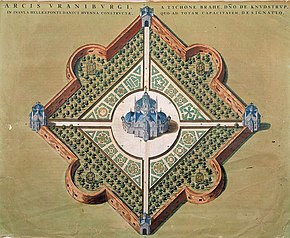 | |
| Named after | Urania |
|---|---|
| Location | Ven, Sweden |
| Coordinates | 55°54′28″N 12°41′48″E / 55.90786°N 12.69664°E |
| Established | 1580 |
| Commercial telescopes | |
| | |


Uraniborg was an astronomical observatory and alchemy laboratory established and operated by the Danish astronomer Tycho Brahe. It was the first custom-built observatory in modern Europe, and the last to be built without a telescope as its primary instrument.
Uraniborg was built c. 1576 – c. 1580 on Ven, an island in the Øresund between Zealand and Scania, Sweden, which was part of Denmark at the time. It was expanded with the underground facility Stjerneborg (Swedish: Stjärneborg) on an adjacent site.
Brahe also innovated and invented many precision instruments which he used to carry out his studies in the observatory. Research was done in the fields of astronomy, alchemy, and meteorology by Tycho and his assistants.
Brahe abandoned Uraniborg and Stjerneborg in 1597 after he fell out of favour with the Danish king, Christian IV of Denmark; Brahe left the country, and the institution was destroyed in 1601 after his death. Ven was later lost to Sweden, and the Rundetårn (Round Tower) in Copenhagen was inaugurated in 1642 as a replacement for Uraniborg's astronomical functions. Restoration of Uraniborg's grounds began in 1985.
